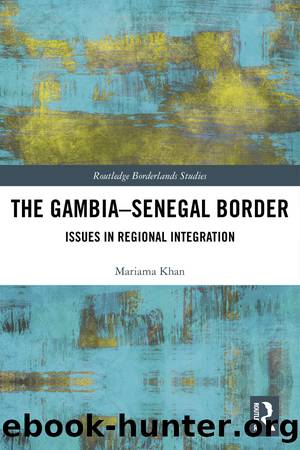The Gambia-Senegal Border: Issues in Regional Integration by Mariama Khan

Author:Mariama Khan [Khan, Mariama]
Language: eng
Format: epub
Tags: African, Developing & Emerging Countries, Social Science, Political Science, World, Regional Studies
ISBN: 9781138387867
Google: vbuZDwAAQBAJ
Goodreads: 44142298
Publisher: Routledge
Published: 2019-05-22T09:25:08+00:00
Gambian responses to the border closures
When the Senegalese transporters closed the border in 2004, Gambian authorities showed mixed reactions to the incident. They considered it a staged economic sabotage from the Senegalese state. In a Skype interview held on 15 January 2013, an official of the Gambian Ministry of Finance and Economic Affairs shared The Gambian governmentâs assessment of the border closure incident. He noted that:
The blocking of the re-export route during action by the unionists is of serious concern to us. Our position has always been that if Senegal wants The Gambia to open up its Trans-Gambia corridor, it should equally grant open access to The Gambia to its routes to Mali. It should allow unfettered access to Mali-bound goods, which come through our port. If Malian and Guinean transporters can enjoy open access to Senegalese routes, we see no reason why Senegal should make it difficult for Gambian transporters to equally use the same routes to go to other countries. Gambian transporters need to be given access to Senegalese routes both within and outside Senegal. Granting access to each otherâs routes has to be mutual. Therefore, granting open access to each other will be a winâwin situation for both countries. As a government we do not buy into the Senegalese response to transporter border blockades. Transporters and the unionists are not government. They can only do certain actions if their authorities properly back them. We are not in competition with Senegal. The economic space is big enough to accommodate both countries in their respective search for benefits to their countries. The ferries have been used as a major excuse in transporter actions. But the Gambia government continues to do all it can to solve the problems we have with the ferries.17
Gambian authorities viewed that the border closure incident was due to interstate rivalries over route access. The Trans-Gambia corridor is part of Gambia-controlled domestic routes leading to Casamance. From this official account, Senegal desires unlimited access to the Trans-Gambia route, which was not being granted by Gambian authorities. Political insecurity in Casamance and the economic opportunities of the region provide legitimate reasons for Senegal to yearn for unlimited access to the Trans-Gambia. The Gambiaâs request to share Senegalese routes to Mali, to enhance its economic lifeline, the re-export trade, is also politically and economically justified.
Superficially, it seems the interstate trouble over the border is an easy one; both countries need to grant the otherâs request and then with equal access the problem will be resolved. But there are complex political and economic ramifications for acceding to each otherâs demands. Consequently, both countries have to weigh the pros and cons of each decision they take regarding this matter to see if they can develop better strategies to achieve the âwin-winâ results the Gambian official envisaged. For example, if Senegal can use Gambian territory and routes to launch retaliatory military action against Casamance rebels, Gambians, especially neighbouring border communities to Casamance would pay a huge price for it. It would compound the insecurity these communities suffer as a result of hit-and-run attacks from the rebels.
Download
This site does not store any files on its server. We only index and link to content provided by other sites. Please contact the content providers to delete copyright contents if any and email us, we'll remove relevant links or contents immediately.
| Historic | Information Systems |
| Regional |
Man-made Catastrophes and Risk Information Concealment by Dmitry Chernov & Didier Sornette(6001)
The Revenge of Geography: What the Map Tells Us About Coming Conflicts and the Battle Against Fate by Kaplan Robert D(4066)
Zero Waste Home by Bea Johnson(3829)
COSMOS by Carl Sagan(3617)
Good by S. Walden(3543)
In a Sunburned Country by Bill Bryson(3528)
The Fate of Rome: Climate, Disease, and the End of an Empire (The Princeton History of the Ancient World) by Kyle Harper(3055)
A Wilder Time by William E. Glassley(2854)
Camino Island by John Grisham(2792)
Organic Mushroom Farming and Mycoremediation by Tradd Cotter(2684)
The Ogre by Doug Scott(2678)
Human Dynamics Research in Smart and Connected Communities by Shih-Lung Shaw & Daniel Sui(2498)
Energy Myths and Realities by Vaclav Smil(2481)
The Traveler's Gift by Andy Andrews(2447)
9781803241661-PYTHON FOR ARCGIS PRO by Unknown(2361)
Inside the Middle East by Avi Melamed(2348)
Birds of New Guinea by Pratt Thane K.; Beehler Bruce M.; Anderton John C(2248)
A History of Warfare by John Keegan(2231)
And the Band Played On by Randy Shilts(2185)
